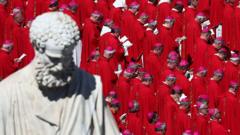In the coming days, 133 cardinals will enter the sacred space of the Sistine Chapel to cast their votes for the successor to Pope Francis. Each cardinal, sworn to lifelong confidentiality, will submit to rigorous measures designed to ensure secrecy. This conclave represents the globe’s most clandestine election, where even those providing essential services, such as medical staff or food service, are bound by oaths of "absolute and perpetual secrecy."
In an effort to keep communication and external influences at bay, all electronic devices, including phones and tablets, must be surrendered upon entry to the conclave. John Allen, editor at Crux, emphasized the Vatican's commitment to isolating the cardinals from outside tampering. Advanced technology, including electronic jammers, is deployed to eliminate any potential breaches during the voting process.
The lockdown not only promises confidentiality but protects the cardinals from nefarious actors. Those involved must be thoroughly vetted and are forbidden from communicating with the electors outside a narrowly defined set of protocols, leaving them in complete isolation apart from necessary communications. Handling breaches of trust is serious business; disobeying the confidentiality oath could lead to ex-communication.
Outside the confines of the conclave, there is a frenzy among reporters and Vatican watchers, eager to spot cardinals before lockdown. Speculations on potential candidates for the papacy proliferate, with stories cropping up about their behaviors and interactions. Cardinal-hunting has become a popular pastime for journalists, with many seen congregating around the Vatican, asking questions of waitstaff in hopes of gleaning insights.
Though the process is framed as spiritual, it is still affected by political currents and media influences. The cardinal's decision bears profound implications—not just for church governance but for wider socio-political issues, from global conflicts to sexual ethics. Insights on candidates circulate, with some cardinals coming under scrutiny from the press for their views and public persona, potentially influencing their chances during the election.
By Wednesday morning, the conclave will commence with all cardinals isolated and ready to embark on this monumental and sacred task. While competing influences are acknowledged, many expect that personal convictions will ultimately steer electors more than vibrant political landscapes or public opinion. The discussions within may prove transformative, as new voices emerge and inspire unexpected outcomes as the cardinals seek the guidance of the Holy Spirit in their deliberations.
In an effort to keep communication and external influences at bay, all electronic devices, including phones and tablets, must be surrendered upon entry to the conclave. John Allen, editor at Crux, emphasized the Vatican's commitment to isolating the cardinals from outside tampering. Advanced technology, including electronic jammers, is deployed to eliminate any potential breaches during the voting process.
The lockdown not only promises confidentiality but protects the cardinals from nefarious actors. Those involved must be thoroughly vetted and are forbidden from communicating with the electors outside a narrowly defined set of protocols, leaving them in complete isolation apart from necessary communications. Handling breaches of trust is serious business; disobeying the confidentiality oath could lead to ex-communication.
Outside the confines of the conclave, there is a frenzy among reporters and Vatican watchers, eager to spot cardinals before lockdown. Speculations on potential candidates for the papacy proliferate, with stories cropping up about their behaviors and interactions. Cardinal-hunting has become a popular pastime for journalists, with many seen congregating around the Vatican, asking questions of waitstaff in hopes of gleaning insights.
Though the process is framed as spiritual, it is still affected by political currents and media influences. The cardinal's decision bears profound implications—not just for church governance but for wider socio-political issues, from global conflicts to sexual ethics. Insights on candidates circulate, with some cardinals coming under scrutiny from the press for their views and public persona, potentially influencing their chances during the election.
By Wednesday morning, the conclave will commence with all cardinals isolated and ready to embark on this monumental and sacred task. While competing influences are acknowledged, many expect that personal convictions will ultimately steer electors more than vibrant political landscapes or public opinion. The discussions within may prove transformative, as new voices emerge and inspire unexpected outcomes as the cardinals seek the guidance of the Holy Spirit in their deliberations.


















